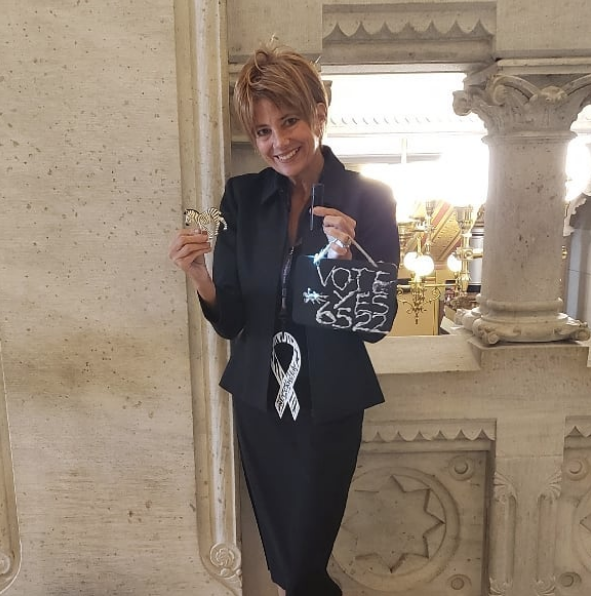Thirty years ago, people laughed at Greta Stifel when she said she wanted to work as a financial investor. In the 1980s, men still dominated the business world, and few considered the rough-and- tumble arena of the stock market a suitable career path for a young woman. Failure, they told her, was sure to follow. Greta pursued her dream anyway, even though it seemed impossible at first. Over the years, and with much hard work, she built a successful business as a investment advisor. It was a demanding career, but one that also provided her the resources to dedicate to her 2 great joys–being outdoors and donating time and money to causes she was passionate about. That was until September 2015, when the diagnosis of neuroendocrine tumor (NET) sent her down a path she had never imagined: first, as a patient advocate for others with the same type of cancer she was battling, and then as a crusader fighting for better medical education to benefit all patients with rare cancers. And on June 5, 2019, Greta made history when the patient advocacy legislation she had created passed unanimously in the Connecticut State Assembly and became state law.

The Search for Answers
In Greta’s case, as it is for many patients with NET, the cancer was discovered at a late stage. The delay in finding a diagnosis had postponed beginning treatment that might have stopped the cancer before it spread to other organs. By the time Greta began receiving treatment, she had stage IV carcinoid tumor, a type of NET, which had metastasized to her liver, reproductive organs, peritoneum, and gastrointestinal (GI) tract. As a result, Greta has endured many major operations and other painful procedures—an experience that is all too familiar to many patients with cancer.
As she describes it, the diagnosis of cancer turned her life upside down. Greta wants to emphasize, however, that this is a “bittersweet story.”
When she was finally diagnosed with NET and began receiving treatments, Greta realized that no one else should have to go through an experience like hers. She decided she wanted to do something meaningful with whatever time she had left to live, which she at first believed would not be very much. During the years she pursued her career in the financial world, helping others to attain economic security, she had given generously of herself to organizations that were concerned with wildlife rescue and sheltering animals. She even won awards and recognition for her philanthropic work. And once more, she wanted to apply her talents for accomplishing what seems impossible.
Zebra Cancers
With the same passion and sense of determination she had applied to earlier challenges, she now had an even greater challenge to tackle. What would have helped Greta in her case, she believes, is better education and awareness about the type of cancer she had been diagnosed with. Although NET is becoming a more common diagnosis and more readily recognized, it is still a rare and little understood illness.
Greta focused her attention on raising awareness, especially among healthcare providers. Physicians can only diagnose something if they know to look for it, and Greta maintains that the standard medical education that physicians now receive does not devote enough time to rare cancers, and that physicians are not adequately trained to look for rare cancers in their daily practice. This occurs, in part, because there is so much to learn that the uncommon illnesses are crowded out of medical school curricula. Reinforcing this tendency is the maxim doctors in training often encounter, “when you hear hoofbeats, think horses--not zebras.” In other words, a patient, statistically speaking, is much more likely to have an ordinary and common diagnosis (a horse) rather than an unusual or a rare illness (a zebra).*
Although this is a good rule of thumb that is intended to prevent unnecessary suffering and expense in the form of needless tests, procedures, and medicines, as with all rules, there are exceptions. Sometimes those hoofbeats are indeed signaling an altogether different animal. Greta wondered if her primary healthcare providers had recognized the signs of NET, would she be in a different place today? “Cancer is expensive, debilitating and emotionally draining. I wish to make things better and easier for patients with NET cancer by providing resources, information, education and awareness programs to help navigate the maze of this rare disease,” says Greta, and to that end she has begun several fundraising and awareness initiatives. including creating the first NET support group at Yale Smilow Hospital and becoming an outspoken representative for fellow patients and for measures that will benefit them, such as increased research, outreach, and support
Her most significant effort, however, may be the piece of legislation that she has worked for tirelessly in her home state of Connecticut and that may change the practice of medicine in that state in a small, but important, way. And it has something to do with identifying those hoofbeats.
Making It Legal
To raise awareness and promote education, Greta began drafting a new law that would require physicians to earn continuing education credits in identifying and treating NET. She believes that all medical professionals, including oncologists, primary care physicians, nurses, and emergency room physicians also need more training in this cancer type, and that they should have resources available to provide patients with appropriate referral information at the very least.
“I believe I am the first patient to create a health reform bill for rare cancer education (in the entire USA),” Greta stated proudly. The bill, HB 6522, An Act Concerning Continuing Medical Education in Screening for Inflammatory Breast Cancer and Gastrointestinal Cancers, has now become state law in Connecticut. The bill stipulates that physicians licensed to practice in that state would need coursework in screening for certain cancers, including NET and other rare GI cancers. It took much lobbying on Greta’s part and hours of work and testimony to make this dream a reality. There was resistance to overcome, but as before, Greta’s passion and determination eventually proved the naysayers wrong. Greta and the supporters who worked with her to move this idea through the complex process of lawmaking would like to see it become law in other states to help as many patients as possible.
Greta continues to seek ways to live fully. She went snow skiing again this past March. It was the first time she had been on the slopes since her diagnosis of NET nearly 4 years ago. It wasn’t easy, she said, but it was exhilarating to be out in the fresh open air again. When asked how she manages to keep moving forward despite all the seemingly impossible obstacles before her, she replied, “if it helps one person, it will have been worth it.”
Patients with cancer and survivors–like Greta–are changing history and making great strides every day in the fight against cancer. They are true Heroes of Hope. If you were moved by Greta’s story and her incredible commitment, be sure to read the stories of other patients who have shown exceptional courage in their own cancer battle and have gone out of their way to help others going through a similar experience.
If you would like to contact Greta for more information, you can reach out to her at www.stiflecancerfoundation.org
Or by e-mail
*The zebra stripe is the NETs and carcinoid cancers awareness symbol.
Do you know a cancer hero?
We would like to invite you to nominate a person with cancer or a survivor whom you believe should be recognized for:
- Outstanding contributions to the cancer community through fundraising activities
- Exhibiting exemplary leadership in a cancer association/organization
- Being a role model to other patients with cancer and survivors
- Exuding extraordinary spirit, grace, and optimism in the face of adversity.
Please note that you are limited to submitting 1 nominee for the Hero of Hope™ Patient Award. The nomination window is open through 11:59 pm EDT on July 12, 2019, and a voting period will follow. The winner will be announced at the 10th Annual Navigation & Survivorship Conference.















